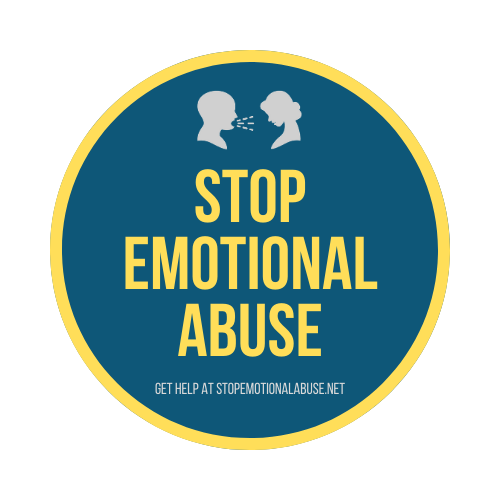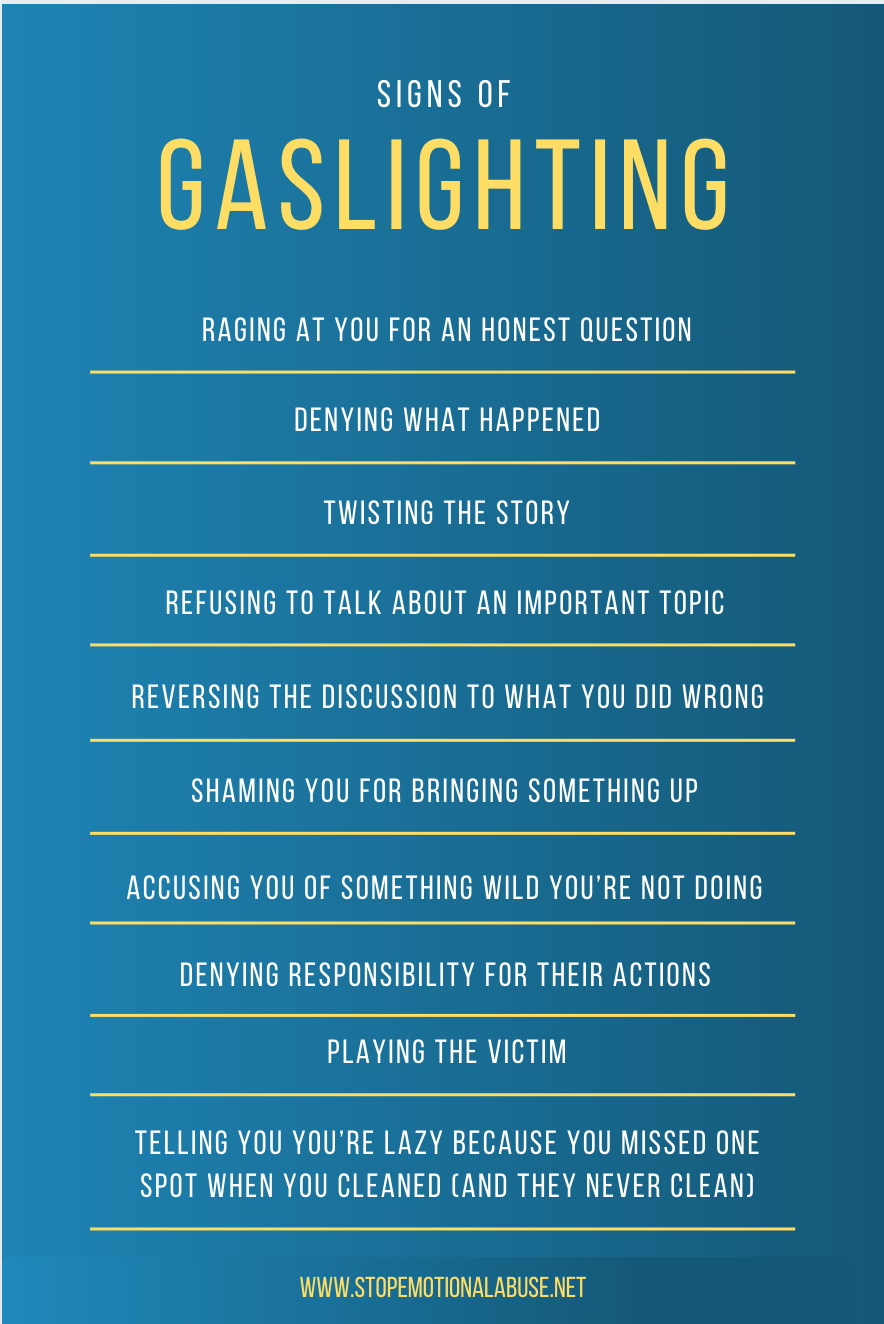Have you been told by your significant other that you remember things incorrectly?
Have you wondered if you’re going crazy because your recollection of how something happened is often different from what your partner says happened?
Or perhaps you’ve tried to bring up something your partner did that hurt you and instead of discussing it, they turn it around with something like, “How can we talk about that when just last week you did what you did,” or “Oh, so now we’re going to talk about how garbage I am? After all I’ve done for you!”
This leaves you wondering if you should have even brought it up AND you feel badly for doing so because of their scoffing answer.
If you’ve had experience like these, you may have been experiencing something called gaslighting. Gaslighting is where a person twists the truth or changes the story to benefit themselves and they do it in such a convincing way you start to question your version of reality.
Usually, it happens with what I call the 3 Ds of Abuse: Deny, Deflect, and Deceive.
An example of deny: Your partner may use phrases like, “I never said that,” even though you KNOW they said it, maybe you even have proof.
Or, you brought up an idea last week that they said was the dumbest idea in the world. Now they’re presenting it like it was their idea and you’re incredulous, trying to set them straight. They respond, “Nope. You’re remembering the conversation wrong. It was my idea. Stop trying to take credit.” You’re baffled how they could really believe it was their idea but they’re so adamant about that it is that you actually start to question your memory of it. Or at the very least your perplexed by the situation that truly makes no sense.
Even worse is when they use the phrase, “You misunderstood,” when you were very clear on what happened, but you start to wonder if maybe you did misunderstand because you know you’re not perfect and misunderstandings do happen.
My friend’s husband emptied the checking account and put all the money in new accounts in his name only. When his wife asked him about it, he replied, “It’s a misunderstanding.” What? How can that be a misunderstanding? But again, they’re so convincing in their delivery and it’s such a wild explanation that no sane person would use, so you really do start to wonder if it was a misunderstanding.
Let’s talk about Deflecting: Gaslighting also occurs when you’re trying to ask for clarification on what should be a minor thing and instead of answering your partner blows up at you and deflects, or accuses you of something rather than answering the question, again leaving you feeling badly for even bringing it up.
Deflecting happens not just with minor things, but important things they don’t want to talk about.
One day Maggie opened a bill addressed to her husband that came to the house, because she’d been paying the bills for years. It was a bill for an STD test. When she mentioned in a calm way that she’d like to talk about that bill, he quickly shut down the conversation, refusing to talk about it. She tried to talk about it again later, also in a calm way. Instead of talking about it, he stonewalled her and then angrily said, “You broke the law by opening my mail!”
Notice what happened there. A refusal to discuss a real issue and a deflection about what MAGGIE had done wrong. Never mind that she had been opening the mail for YEARS without her husband having a problem with it before.
Another common gaslighting tactic is when you ask them about someone specifically, a member of the opposite sex because your gut is telling you something is going on and they respond, “Don’t be so jealous, we’re just friends.” Or “Sara? Yeah, she thinks I’m pretty hot, but don’t worry, her butt is too big.” That last statement doesn’t leave you feeling much better and probably isn’t the truth anyway. It’s just an attempt to deflect from the truth that there is something going on.
Gaslighting also occurs when your partner claims they’re “just joking” after saying something rude or offensive. They say, “You’re too sensitive,” when you’re trying to tell them something that bothers you. Or “Can’t you take a joke,” after they’ve just done something inappropriate or said something very hurtful.
You see how each of these phrases takes the focus off of what THEY’VE done and makes you responsible for their actions. No apology, no acknowledgement. Just shifting the blame to you, causing you to wonder if maybe you ARE too sensitive. Another form of deflection from the real issue.
But here’s the thing: If someone cares about you, they don’t make jokes at your expense and then tell you that you’re the problem for getting hurt.
Here are some other Deflecting phrases abusers use when they’re gaslighting:
“You’re so paranoid.” When you’re trying to discuss something that doesn’t feel right to you.
“I doubt I said it like that.” When you’ve just recounted to them how exactly how they said something.
“I wouldn’t have done that.” When they in fact did.
“I’m not that type of person.” After you mention something they did that was hurtful. Notice they’re painting themselves as a saint who couldn’t possibly have done something like that. You know you were hurt by what they did, but they’re so convinced they’re not that type of person, it causes you to question what’s real.
It’s SO CONFUSING and so hard to describe – to yourself or anyone else. You’re left frustrated, confused, and lost. You don’t even know where to go for help. That’s why we’re here.
Gaslighting is especially dangerous when the abuser tells you how you thought or felt about something in opposition to the real version. Did you catch that? They tell YOU how YOU thought or felt.
Phrases like, “You liked it when that guy was staring at you in the store.” When you respond you didn’t even notice the guy or that you didn’t like it, the abuser responds, “Yeah right. Don’t lie to me. You wanted him. I could tell.”
You honestly didn’t really even notice that guy and your partner is telling you something different. Again, they’re so convinced that you actually do start to wonder, “Did I like it and I’m just denying it?”
Then there’s the third D of abuse, Deceiving, or outright lying.
“Those pictures were sent from a hacked account.”
Or it’s 11:30 PM, his phone is ringing or blowing up with texts. You ask, who’s that? He responds, “Tom, he wants to plan our camping trip.”
Really? His buddy Tom called at 11:30 at night to talk about a camping trip? But again, the answer was so quick and he and Tom are going camping in three weeks and you do want to believe him, so you convince yourself it must have been Tom, even though it doesn’t make much sense and your gut is telling you otherwise.
As I said, if you’re experiencing gaslighting, it’s frustrating and starts to make you wonder if you really are going crazy. The other person seems so convinced they’re telling you the truth and their answers are sometimes so wild that you have to believe it because it’s so implausible otherwise. No sane person would give that as an answer, so it must be true. At least that’s what you subconsciously tell yourself.
That’s why gaslighting is so effective for the abuser to get what they want. They’ve thrown you off the scent of truth which allows them to build their version of the story however they like, however it suits their agenda, the truth be damned.
So let me now share 5 quick tips when dealing with gaslighting to help keep you safe and sane.
1. Listen to your gut. Your gut knows what’s up, but for years you’re partner has told you that you’re intuition and feelings can’t be trusted, that they’re wrong. Guess what? They’re not. The gaslighter just hates you listening to those feelings because it interferes with their plans. Pay more attention to your gut.
2. Do not engage. This one is vital. When the abuser is gaslighting, don’t engage. In the example where the husband said, “You really liked that the young guy looking at you,” instead of denying, defending, or justifying her actions or feelings, the wife should simply say, “No, that’s not what happened,” and move on.
If the abuser keeps at it, she can ignore him or respond, “If that’s they way you see it, OK.” Or “I’m not going to fight with you about my own feelings.” And end it. Walk away. Change the subject. They may try to pull you back into the conversation or accuse you of something so you feel compelled to defend yourself. Don’t take the bait.
3. Document. If it’s safe to do so, document these interactions so you can see you’re not going crazy. You did remember how it really happened. When they attempt to sell you on another version of the events, you know better.
And please don’t mention you have it in your journal because all they’ll do then is hold the fact that you journal against you. “Oh, the journal is so you can prove to the court how messed up I am so you can take all my money?” again gaslighting you. Or they’ll try to find and destroy the journal.
4. Get educated on gaslighting so you can more clearly see it. Check out social media like ours at Stop Emotional Abuse on Pinterest where we have a board dedicated to understanding gaslighting and many more boards that will probably give you words for things you couldn’t explain before.
5. Learn to set boundaries on what you’re willing to accept as far as treatment and what you won’t accept. Boundaries are essential because they put you in control of your experience. I’ll post a video and article on boundaries shortly, so look for that.
And Please, one more tip: don’t tell the other person you think they’re gaslighting you, or that they’re a bully or abusive, or have them watch a video to show them what they’re doing or how it affects you. It doesn’t help. In their mind, they can’t be wrong about anything. We discuss that in depth in the online abuse recovery program, Stop Emotional Abuse. For now, just know that you gain NOTHING by trying to help them see what they’re doing. Just worry about you, OK?
If you’re ready to break free from unhealthy patterns and find the peace and freedom you deserve, check out our complete abuse recovery program.






